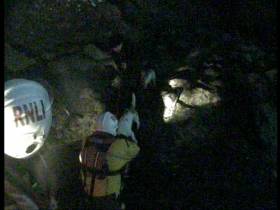Displaying items by tag: Loughshinny
Skerries Lifeboat Rescues Dogs & Owners From Rising Tide
#RNLI - Skerries RNLI rescued a man and a woman and two dogs on Sunday evening (9 April) after they had been stranded on rocks by the rising tide in Loughshinny.
Dublin Coast Guard tasked Skerries RNLI shortly before 9pm on Sunday evening, having received a 999 call from two people who had been cut off by the tide.
The lifeboat was launched with volunteer Eoin Grimes at the helm and crewed by Paddy Dillon, Emma Wilson and Peter Kennedy.
Making their way directly to Loughshinny Harbour, the lifeboat crew began a search of the immediate area. They spotted the casualty on the rocks using the light on a mobile phone to signal for help.
The casualties were taken on board the lifeboat and dropped back to the harbour, where they were met by volunteers from Skerries Coast Guard unit.
Conditions at the time were moderate with a Force 3 to 4 northerly wind.
Speaking about the callout, Skerries RNLI lifeboat operations manager Niall McGrotty said: “We’d like to remind everyone making the most of the coast in the good weather to always check the tides and forecast for the area and to carry a means of calling for help.”
Health Minister Speaks Out Against Fingal Sewerage 'Super Plant'
#NEWS UPDATE - The Minister for Health has raised concerns over a new water treatment 'super plant' planned for Fingal, amid fears that a malfunction could see huge amounts of raw sewerage pumped into the Irish Sea.
As reported in The Irish Times, Dr James Reilly echoed worries expressed by his north Dublin constituents and members of community group Reclaim Fingal Alliance, noting that the people of Skerries, Loughshinny and Rush are particularly "worried about the effects of the outfall pipe in their area".
The minister said that none of the nine sites being considered by Fingal County Council and Greater Dublin Drainage was suitable for sewerage treatment, and that any waste should be treated to "advanced levels" to make the outfall as clean as possible, thereby avoiding adverse impact on shellfish beds.
As many as 10,000 letters of objection have been lodged against the plan by campaigners including local farmers and environmentalists.
The Irish Times has more on the story HERE.

























































